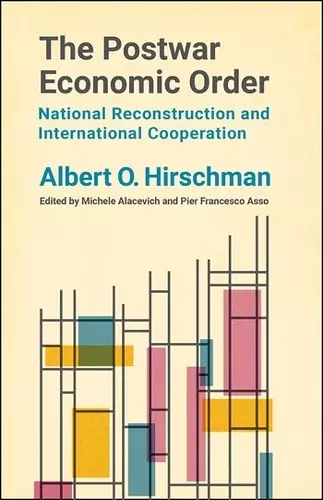The Postwar Economic Order
National Reconstruction and International Cooperation
Albert O Hirschman author Michele Alacevich editor Pier Francesco Asso editor
Format:Hardback
Publisher:Columbia University Press
Published:22nd Nov '22
Currently unavailable, and unfortunately no date known when it will be back

This book presents a collection of reports by Albert O. Hirschman on postwar economic policies and the early days of European cooperation, showcasing his analytical insights.
In The Postwar Economic Order, readers are introduced to the influential work of Albert O. Hirschman during the critical years of postwar Europe. Before he became a celebrated social scientist, Hirschman was deeply involved in the reconstruction efforts following World War II. This book compiles a series of his insightful reports that address economic policies, early attempts at intra-European cooperation, and the establishment of a new international economic framework centered around the United States.
Between 1946 and 1952, Hirschman served as an economic analyst at the Federal Reserve Board, where he focused on the Marshall Plan and the broader reconstruction of Europe. His reports provide a unique perspective on the challenges faced by European nations as they navigated the complexities of recovery. The collection reveals the intricate discussions surrounding the postwar “dollar shortage,” U.S.-European relations, and the initial steps toward European economic integration.
The Postwar Economic Order not only highlights Hirschman’s analytical prowess but also showcases his ability to articulate the paradoxes inherent in economic and political processes. Through his nuanced interpretations, readers gain a deeper understanding of the origins of European economic cooperation. This book is an essential resource for anyone interested in the evolution of economic thought and the historical context of postwar recovery efforts.
Between the early Albert Hirschman who did uncredited work for Alexander Gerschenkron and the late Hirschman who was a celebrated development economist is the forgotten Hirschman who analyzed Europe for the Federal Reserve Board. Michele Alacevich and Pier Francesco Asso have done us a service by collecting Hirschman's unpublished reports on post-World War II Europe between 1947 and 1952. Hirschman appears as an already fully-formed development economist attuned to the complexities of a multisector economy but also as a sophisticated analyst of monetary factors that, interestingly, fall away in his subsequent work. A must-read not just for historians of economic thought but also for scholars of economic development. -- Barry Eichengreen, George C. Pardee & Helen N. Pardee Chair and Distinguished Professor of Economics and Political Science, University of California, Berkeley
These collected reports provide a unique vantage point on the postwar coevolution of European integration, multilateralism, and the Marshall Plan. We see that Hirschman's postwar tenure as a researcher at the Fed's Western European desk was deeply formative and intellectually fertile. In these reports we see embryos of what later became Hirschman's signature epistemic, theoretical, and normative commitments. In this way, the collection provides us with insight into the intellectual development of one of the twentieth century's most powerful and original intellects. -- Ilene J. Grabel, Distinguished University Professor, Josef Korbel School of International Studies, University of Denver
This important volume illuminates the unorthodox and pragmatic views on postwar Europe and a new international economic order of one of the twentieth century's most prominent social scientists. Brilliantly introduced, these little-known essays provide food for thought on Europe's way forward and the relaunch of an open international environment. -- Gianni Toniolo, LUISS School of European Political Economy, Rome
A valuable instrument for both historians and economists, in order to better appreciate a heterodox economist and reformer. * Journal of European Economic History *
A timely contribution to ongoing debates in economic, international, and business history. * Business History Review *
These are two wonderful books which should be read by all those interested in economic development and international relations. They help us understand how the interplay between ideas, power and structural constraints — both at the domestic and international economic levels — affects the direction of economic change and determines its success or failure in fostering growth, welfare and political democracy. * Development and Change *
- Winner of Best Scholarly Edition Award, European Society for the History of Economic Thought 2024
ISBN: 9780231200585
Dimensions: unknown
Weight: unknown
352 pages